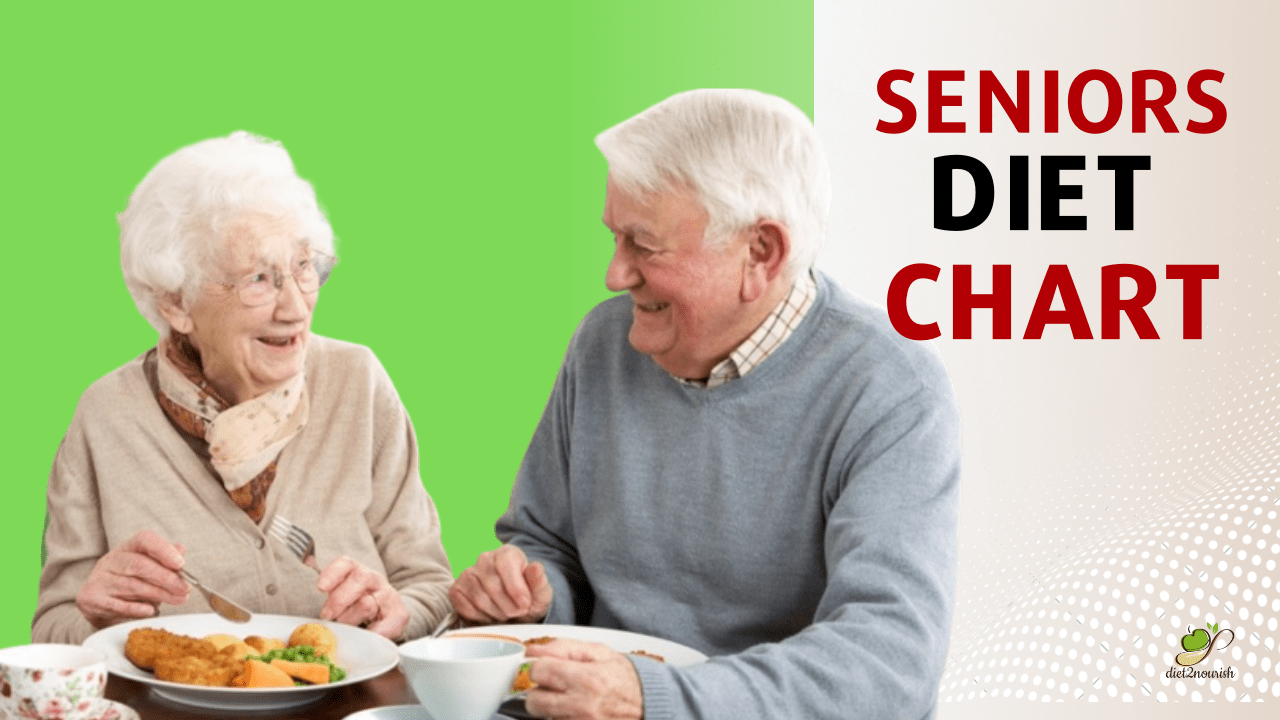

As individuals age, their nutritional needs and dietary requirements change. It becomes essential to adopt a well-balanced and nutrient-rich diet to support overall health, prevent age-related illnesses, and maintain optimal well-being. An old age diet chart provides a framework for older adults to follow, ensuring they receive the necessary nutrients while taking into account any specific health conditions. In this article, we will discuss the importance of an Old Age Diet Chart and provide some guidelines for creating a nutritious and well-rounded diet for older adults.
The aging process brings about several changes in the body, including a decrease in metabolism, changes in body composition, and a decline in organ function. These changes can affect nutrient absorption, digestion, and overall nutritional status. Therefore, it is crucial to focus on nutrient-dense foods that provide essential vitamins, minerals, fiber, and antioxidants while managing portion sizes to prevent weight gain or loss.
A well-planned old age diet chart should include a variety of food groups to ensure a balanced intake of nutrients. Here are some key components to consider:
Whole Grains: Include whole grains such as whole wheat, brown rice, quinoa, oats, and barley. These provide complex carbohydrates, fiber, and B-vitamins necessary for energy production, digestion, and bowel health.
Fruits and Vegetables: Aim for a colorful array of fruits and vegetables to provide a wide range of vitamins, minerals, antioxidants, and fiber. Include leafy greens, berries, citrus fruits, cruciferous vegetables, and other colorful options to boost immune function, support heart health, and promote overall well-being.
Protein: Incorporate lean protein sources such as poultry, fish, eggs, beans, lentils, tofu, and low-fat dairy products. Protein is essential for tissue repair, muscle strength, and immune function. It also aids in maintaining bone health, which is crucial in old age.
Healthy Fats: Include sources of healthy fats like avocados, nuts, seeds, olive oil, and fatty fish such as salmon or mackerel. These provide omega-3 fatty acids, which have anti-inflammatory properties and support brain health and cardiovascular function.
Calcium and Vitamin D: Older adults are prone to bone density loss, so it is crucial to include calcium-rich foods like low-fat dairy products, leafy greens, and fortified plant-based milk. Additionally, exposure to sunlight and fortified foods can help meet the vitamin D requirements for proper calcium absorption.
Hydration: Staying hydrated is essential for older adults, as they may have a reduced sense of thirst. Encourage regular water intake and include hydrating foods such as soups, fruits, and vegetables with high water content.
Fiber: Adequate fiber intake is important for digestive health and preventing constipation. Include whole grains, fruits, vegetables, legumes, and nuts in the diet to meet fiber requirements.
It is crucial to consider any underlying health conditions or dietary restrictions while creating an old age diet chart. For example, individuals with diabetes may need to manage their carbohydrate intake, while those with hypertension may need to limit sodium intake. Consulting a registered dietitian or nutritionist can be beneficial in developing a personalized diet plan that addresses specific health concerns.
In addition to following a nutritious diet, older adults should maintain a regular exercise routine, get sufficient sleep, and manage stress levels. These lifestyle factors, combined with a well-rounded diet, can contribute to improved overall health and well-being in old age.
In conclusion, an old age diet chart plays a vital role in ensuring that older adults receive the necessary nutrients to support their health and well-being. A balanced diet that includes a variety of food groups, including whole grains, fruits, vegetables, lean proteins, healthy fats, and adequate hydration, is crucial.


Hyderabad, the vibrant city of Telangana, is home to several renowned dieticians who have gained recognition for their expertise, knowledge, and dedication to promoting healthy living through personalized nutrition plans. These Best Dietician in Hyderabad have helped countless individuals achieve their health and wellness goals by providing evidence-based recommendations, practical strategies, and ongoing support. In this article, we will explore some of the best dieticians in Hyderabad who have made significant contributions in the field of nutrition and dietetics.
One prominent dietician in Hyderabad is Ms. Deepalekha Sharma, the founder of NutriGlow. With her extensive experience and expertise in therapeutic nutrition, Ms. Sharma offers personalized diet plans to individuals with various health concerns, including weight management, diabetes, cardiovascular diseases, and digestive disorders. She believes in a holistic approach to nutrition that combines the right balance of macronutrients, micronutrients, and dietary modifications to improve overall health and well-being. Ms. Sharma's evidence-based recommendations, practical guidance, and compassionate approach have made her a sought-after dietician in Hyderabad.
Another notable dietician in Hyderabad is Ms. Anushree Somani, the founder of Nourish and Flourish. With her deep understanding of nutrition and wellness, Ms. Somani specializes in areas such as weight management, sports nutrition, and women's health. She offers personalized nutrition plans that take into consideration individual goals, lifestyle factors, and dietary preferences. Ms. Somani's approach focuses on educating her clients about the importance of balanced nutrition and empowering them to make sustainable lifestyle changes. Her commitment to helping individuals achieve optimal health and performance has earned her a reputation as one of the best dieticians in Hyderabad.
Additionally, Ms. Sweta Uchil-Purohit, a renowned dietician and founder of Nutripledge, is highly regarded in Hyderabad for her expertise in clinical nutrition. With her in-depth understanding of medical conditions and their dietary implications, Ms. Uchil-Purohit provides personalized nutrition plans to individuals with specific health concerns such as gastrointestinal disorders, hormonal imbalances, and food allergies. She combines the science of nutrition with practical strategies to help individuals manage their health conditions effectively. Ms. Uchil-Purohit's compassionate approach, evidence-based recommendations, and ongoing support have made her a trusted name in the field of nutrition in Hyderabad.
When choosing a dietician in Hyderabad, it is important to consider their qualifications, experience, and specialized knowledge in your specific area of interest or concern. Look for professionals who have formal education in nutrition and dietetics, as well as relevant certifications. Additionally, consider their ability to understand your individual needs, preferences, and any underlying medical conditions. A dietician who takes a personalized approach, provides evidence-based recommendations, and has a track record of success in helping individuals achieve their health goals is an invaluable partner on your wellness journey.
In conclusion, Hyderabad is home to some of the best dieticians who have made significant contributions in the field of nutrition and dietetics. These professionals offer personalized nutrition plans, evidence-based recommendations, and practical strategies to help individuals achieve their health and wellness goals. Whether you are looking to manage a specific health condition, improve your sports performance, or adopt a healthier lifestyle, the expertise and guidance of a dietician can make a significant difference. The dieticians mentioned above, among many others in Hyderabad, have proven their dedication to improving the lives of their clients through their exceptional services.




When it comes to finding the best dietician in Hyderabad, one name that stands out is Dr. Meera Sharma. With her exceptional qualifications, extensive experience, and dedication to improving the health and well-being of her clients, Dr. Meera Sharma has established herself as a trusted and highly sought-after dietician in the city. In this 1000-word paragraph, we will delve into the reasons why Dr. Meera Sharma is considered the Best Dietician in Hyderabad
Dr. Meera Sharma is a highly qualified and experienced dietician with a deep understanding of nutrition and its impact on overall health. She holds a master's degree in Nutrition and Dietetics and a Ph.D. in the same field. With her extensive educational background, Dr. Meera Sharma brings a wealth of knowledge to her practice, ensuring that her clients receive accurate and up-to-date information regarding their dietary needs.
One of the key factors that sets Dr. Meera Sharma apart is her ability to create personalized diet plans tailored to each client's unique needs and goals. She believes in the power of customization and recognizes that no two individuals are the same. Dr. Meera Sharma takes the time to thoroughly assess her clients' medical history, lifestyle, dietary habits, and preferences before designing their diet plans. This personalized approach ensures that her clients receive a plan that is practical, sustainable, and enjoyable, making it easier for them to incorporate healthy eating habits into their daily lives.
Dr. Meera Sharma specializes in various areas of nutrition, including weight management, diabetes management, heart health, gastrointestinal disorders, and sports nutrition. Her expertise in these fields allows her to address specific health concerns and provide targeted dietary guidance to her clients. Whether someone is looking to lose weight, control their blood sugar levels, improve their heart health, manage digestive issues, or enhance their athletic performance, Dr. Meera Sharma has the knowledge and skills to create effective and personalized diet plans.
Another aspect that makes Dr. Meera Sharma the best dietician in Hyderabad is her holistic approach to nutrition. She believes in treating the body as a whole and emphasizes the importance of nutrition in promoting overall well-being. Dr. Meera Sharma takes into consideration not only the physical aspects of her clients' health but also their mental and emotional well-being. She educates her clients on the importance of a balanced lifestyle, stress management, regular physical activity, and adequate sleep in addition to proper nutrition. By addressing these various aspects, Dr. Meera Sharma helps her clients achieve optimal health and a better quality of life.
Dr. Meera Sharma's dedication to her clients is evident in her personalized and compassionate approach. She takes the time to actively listen to her clients' concerns, understanding their unique challenges and goals. Dr. Meera Sharma believes in empowering her clients by educating them about nutrition and providing them with the tools and knowledge they need to make informed decisions about their diet and lifestyle. Her supportive and non-judgmental demeanor creates a comfortable and trusting environment where clients feel motivated and supported throughout their journey towards better health.
Furthermore, Dr. Meera Sharma stays updated with the latest research and developments in the field of nutrition. She actively engages in continuing education, attends conferences, workshops, and seminars, and keeps herself informed about the latest advancements in nutrition science. This commitment to ongoing learning allows her to provide her clients with evidence-based recommendations and the most current information in the field.
In addition to her individual practice, Dr. Meera Sharma is actively involved in community outreach programs. She conducts nutrition workshops, seminars, and awareness campaigns to promote healthy eating habits and nutrition education in Hyderabad. Dr. Meera Sharma's passion for spreading nutritional awareness and making a positive impact on the community has earned her the respect and admiration of both clients and colleagues.


